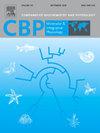Time-course of mRNA abundance of appetite-regulatory genes in the brain of rainbow trout fed a plant-based diet from the first feeding
IF 2.2
3区 生物学
Q4 BIOCHEMISTRY & MOLECULAR BIOLOGY
Comparative Biochemistry and Physiology A-Molecular & Integrative Physiology
Pub Date : 2025-10-06
DOI:10.1016/j.cbpa.2025.111939
引用次数: 0
Abstract
The early developmental stages of fish are critical for improving feeding strategies and growth performance. Understanding feeding-regulatory mechanisms from the earliest stages of development is crucial, especially in the context of aquaculture, where early nutrition has a significant impact on feeding behaviour, growth and survival. This is particularly relevant in carnivorous species, such as rainbow trout (Oncorhynchus mykiss), where the complete replacement of fishmeal and fish oil with plant-based ingredients has negative effects on growth performance and early stage survival. This study investigates the time-course of mRNA abundance of genes encoding key appetite-regulatory neuropeptides and integrative signalling pathways from first feeding to 100 days post-feeding with either a commercial-like diet containing fishmeal and fish oil or a plant-based diet devoid of these marine-derived ingredients. Results showed that an initial diet based on plants does not notably affect the levels of mRNA for appetite-regulating neuropeptides in the brain of rainbow trout alevins. However, the plant-based diet induced slightly distinct patterns in gene mRNA abundance after the first meal, which may underpin reduced feed intake and growth performance. Some key appetite-regulatory neuropeptides, such as neuropeptide Y (npy) and cocaine- and amphetamine-regulated transcript (cartpt), exhibited progressive higher levels in the brain over time, while agouti-related protein 1 (agrp1) and pro-opiomelanocortin a1 (pomca1) levels decreased following initial feeding. Moreover, the expression of key integrative signalling components, including AMP-activated kinase α2 (pkraa2), mechanistic target of rapamycin (mtor), cAMP response-element binding protein 1 (creb1), and forkhead box O1 (foxo1), increased throughout growth, but their abundance was modulated differently by the dietary treatments. This study underscores the importance of understanding neuroendocrine responses to dietary formulations for optimizing aquafeeds and enhancing sustainability in aquaculture.

从第一次喂食植物性饮食开始,虹鳟鱼大脑中食欲调节基因mRNA丰度的时间历程。
鱼类的早期发育阶段对改善摄食策略和生长性能至关重要。从发育的最初阶段就了解摄食调节机制至关重要,特别是在水产养殖的背景下,早期营养对摄食行为、生长和生存有重大影响。这在虹鳟(Oncorhynchus mykiss)等肉食性物种中尤其重要,在这些物种中,用植物性成分完全替代鱼粉和鱼油对生长性能和早期生存有负面影响。本研究调查了编码关键食欲调节神经肽和综合信号通路的基因mRNA丰度的时间过程,从第一次喂食到喂食后100 天,喂食含有鱼粉和鱼油的商业化饮食或不含这些海洋来源成分的植物性饮食。结果表明,最初的植物性饮食对虹鳟鱼大脑中食欲调节神经肽mRNA的水平没有显著影响。然而,植物性日粮在首餐后诱导的基因mRNA丰度略有不同,这可能是采食量降低和生长性能下降的原因。一些关键的食欲调节神经肽,如神经肽Y (npy)和可卡因和安非他明调节转录物(cartpt),随着时间的推移在大脑中表现出逐渐升高的水平,而豚鼠相关蛋白1 (agrp1)和促鸦片黑素皮质素a1 (pomca1)水平在初始喂食后下降。此外,在整个生长过程中,cAMP活化激酶α2 (pkraa2)、雷帕霉素机制靶点(mtor)、cAMP反应元件结合蛋白1 (creb1)和叉头盒蛋白1 (foxo1)等关键综合信号成分的表达均有所增加,但其丰度受饮食处理的影响不同。本研究强调了了解饲粮配方对优化水产饲料和提高水产养殖可持续性的神经内分泌反应的重要性。
本文章由计算机程序翻译,如有差异,请以英文原文为准。
求助全文
约1分钟内获得全文
求助全文
来源期刊
CiteScore
5.00
自引率
4.30%
发文量
155
审稿时长
3 months
期刊介绍:
Part A: Molecular & Integrative Physiology of Comparative Biochemistry and Physiology. This journal covers molecular, cellular, integrative, and ecological physiology. Topics include bioenergetics, circulation, development, excretion, ion regulation, endocrinology, neurobiology, nutrition, respiration, and thermal biology. Study on regulatory mechanisms at any level of organization such as signal transduction and cellular interaction and control of behavior are also published.

 求助内容:
求助内容: 应助结果提醒方式:
应助结果提醒方式:


